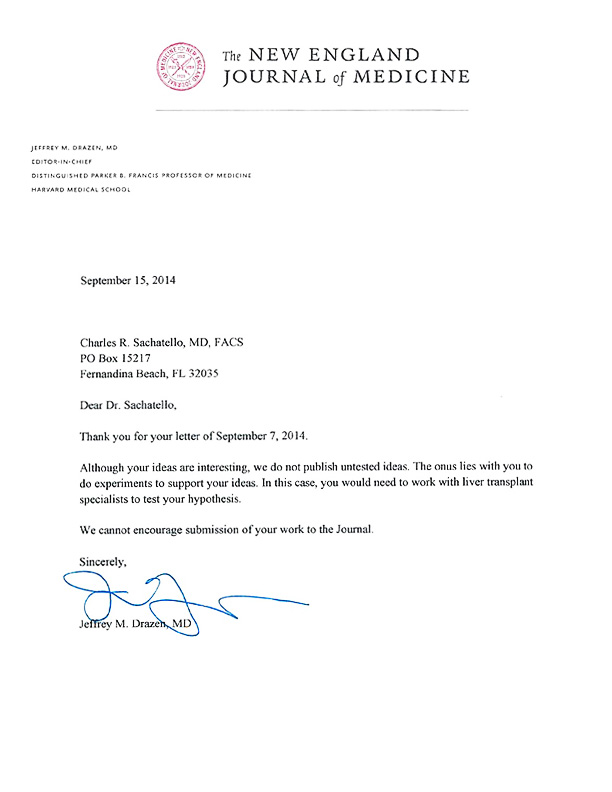The author submitted a 134 word hypothesis, along with supplemental Information, directly to the Editor in Chief of the New England Journal of Medicine on 9/7/2014. He received the accompanying rejection letter (9/15/2014) in the return mail:
Please note the comments by Dr. Drazen concerning a possible liver transplant. The author of the Liver-Brain-Theory proposed that a liver transplant may very well arrest or prevent the progression of the muscle wasting associated with ALS more than 18 months prior to attempting to publish this theory. This concept was a logical conclusion of the unproved premise that hepatic generated neurotoxins were the proximate cause of most types of neurodegenerative diseases.
The author was initially dismayed to see this rejection letter. On re-reading it however, he was pleased that Dr. Drazen’s note confirmed his research findings: the NEJM had never published a single theory or hypothesis attempting to account for the cause of any type of neurodegenerative disease in the preceding one hundred years or more.
Not at all discouraged by this initial rejection of this hypothesis, the author proceeded to attempt to publish a similar version of the Liver-Brain-Theory in “NEUROLOGY®."
On November 12, 2014, the author received several separate emails from their editorial staff: “Your manuscript will not be considered for publication, until you have approved the submission.”
Seven days later, November 19, 2014, 9:30 AM, the author received a formal notice (via email) from the office of the Editor in Chief: “Your manuscript has been reviewed by one or more of the editors and is being returned without review.” we regret that this decision is final.”
Having no other acceptable option to publish this theory elsewhere, the author elected to publish it online:
The author of this theory personally encourages everyone to shred this theory to pieces! It should be very simple to those in the know, especially the so called "experts", to prove that this theory is categorically implausible!
It is only natural that these ideas be viewed with skepticism and disbelief by all students of neurodegenerative diseases. Every neurologist in the world has been educated and has learned from his own personal clinical experience: ALS is a totally incurable disease. Death will occur with certainty within 24 -60 months of the initial diagnosis in 95% of his patients.
The heretical idea that a liver transplant could possibly arrest the inevitable progression of muscle weakness in ALS is not based on any laboratory experience or experiments. It is the conceptual work product of the mind of a single Individual: one with no credentials whatsoever in the art or science of Neurology. Why does this upstart deserve any credibility what so ever?
Surely such thinking occurred in the upper echelons of the ALS Organization when they elected not to post these ideas on their website.
The authors response: If the basic premise of the Liver-Brain-Theory is correct: "that it is an aging liver, not an aging brain or neurons, that promotes the development of neurodegenerative diseases" then the following study should be done for the benefit of both ALS and Alzheimer's patients as soon as practical.
There are more than 100,000 patients alive today with a liver transplant. There is an enormous variability between the chronological age of the host and of the chronological age of the new Liver in most of these patients. In the author case, his new liver is 37 years younger than he is.
The incidence of ALS is roughly estimated to be 1 in 450,000. It is highly unlikely that any liver transplant patient would develop ALS based purely on statistical probability.
Alzheimer's disease presents more meaningful data in a specific clinical area: the well recognized increased incidence in females, versus males: (nearly 2 to 1). Similarly Alzheimer's disease is truly a disease of aging: non genetic Alzheimer’s is rarely diagnosed clinically before age 60.
The probability of a liver transplant patient developing Alzheimer’s should correlate directly with the age of the transplanted liver rather than the chronological age of its host.
Should these clinical studies be confirmed, as the author anticipates they will, it will lend additional support to approving a liver transplant in an otherwise healthy patient with ALS, an inevitably terminal disease.
Nevertheless a patient Lou Gehrig’s age (35) should not be denied the opportunity to submit himself to a liver transplant hoping to arrest the progressive loss of muscle strength and possibility avoid his otherwise certain premature death from ALS in view of the fact that ALS is still a disease without know cause or cure after its original description nearly 200 years ago in 1824.
Updated and revised: 9/20/2018
← Go Back to Previous Section Continue to Next Section →
